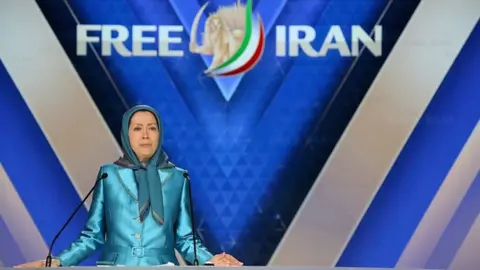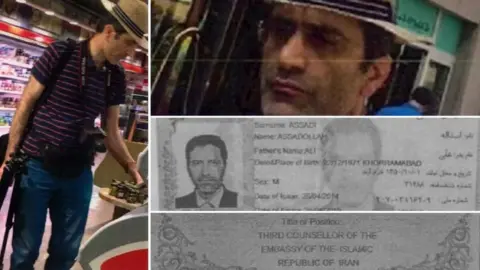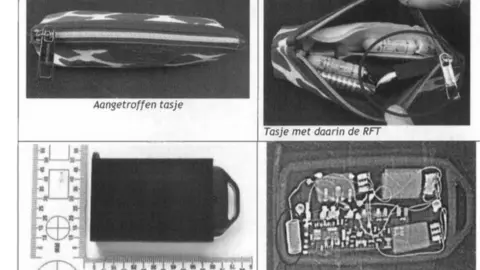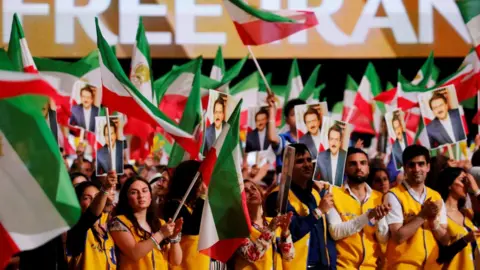France bomb plot: Iran diplomat Assadollah Assadi sentenced to 20 years
 AFP
AFPAn Iranian diplomat has been convicted of a plot to bomb a big French rally held by an exiled opposition group.
Assadollah Assadi, 49, who worked at the Iranian embassy in Vienna, was given a 20-year jail term by the court in Antwerp in Belgium.
It was the first time an Iranian official had faced such charges in the EU since the 1979 revolution.
Three others were also convicted. They were arrested during a joint operation by German, French and Belgian police.
Tehran insists the plot was a fabrication.
Tens of thousands of people attended the June 2018 rally outside Paris, including Donald Trump's lawyer Rudy Giuliani.
The verdict comes weeks after US President Joe Biden took office, with Iran hoping he will reverse some of the sanctions introduced by his predecessor.
France blamed Iran's intelligence ministry for the planned attack and responded by freezing the assets of two senior Iranian officials.
Prosecution lawyer Georges-Henri Beauthier told reporters the ruling showed two things: "A diplomat cannot just do anything. He has immunity related to his position, he does not have immunity for criminal and terrorist acts he committed."
In a statement, an Iranian foreign ministry official strongly objected to Assadi's arrest, trial and sentencing, condemning the process as "illegal and a clear violation of international law, especially the 1961 Vienna Convention (on diplomatic relations)".
 NCRI
NCRIMaryam Rajavi, the leader of the group targeted by the plot, described the conviction as "a brilliant victory for the people and resistance of Iran and a heavy political and diplomatic defeat for the regime".
In a statement she claimed the plot had been authorised at the highest levels in Iran, by the president and supreme leader and that the intelligence ministry had been given the task of carrying it out.
What happened?
Assadi was arrested in Germany in June 2018, days after he met a Belgian couple of Iranian origin at a Pizza Hut in Luxembourg. They were being watched during their stay in Luxembourg by local intelligence.
Nasimeh Naami and Amir Saadouni were arrested in Brussels with half a kilogram (1.1lb) of explosives and a detonator, which prosecutors said was to be used against an Iranian opposition meeting in France. Belgium's Dovo bomb disposal unit released a report detailing how the TATP explosive was carried along with batteries, an antenna and a remote-control finger-operated button transmitter, or RFT (below).
 Dovo
DovoThe couple admitted receiving the package from Assadi, but denied knowing what was inside.
A fourth man, Belgian-Iranian poet Merhad Arefani, was arrested in Paris and accused of being an accomplice. All three were convicted of taking part in the plot and given jail terms of 15 to 18 years.
Who was the target of the attack?
The plot centred around a rally held by the exiled National Council of Resistance of Iran (NCRI) outside Paris in June 2018.
Allow X content?

The event was attended by thousands of Iranians living in Europe, as well as international political figures.
The NCRI is considered to be the political arm of Mujahideen-e-Khalq (MEK), a dissident group that backs the overthrow of the Islamic Republic.
 Reuters
ReutersThe group, which Iran has designated as a terrorist organisation, assassinated a number of high-profile Iranians during the 1980s, but has since become a powerful lobbying group abroad.

Opposition activists celebrate verdict

There were cheers inside the Antwerp court and then singing and chanting outside, as Iranian opposition activists celebrated the verdict.
A few dozen waved the opposition flag of Iran as armed police looked on.
Raha Heshmatikhah, a 24-year-old student who had travelled from the Netherlands, told me she was happy but also scared that there may be retaliation from authorities in Tehran.
She was at the Paris rally in 2018 that was the intended target of the bombing.


